SevenGen Indigenous Youth Energy Summit
The third biennial SevenGen Summit will aim to bring Indigenous youth from across so-called Canada together for a unique by Indigenous youth, for Indigenous youth experience. With a theme of “Infinite Voices, Shared Futures”, SevenGen 2024 will empower Indigenous youth to amplify their own and each other’s voices, as a way to chart a course to a just and sustainable energy future for every community.
This year we aspire to bring together to learn from the voices of Indigenous youth from across the North, who historically and presently continue to be excluded in the clean energy and climate action conversation.
Applications are open now!
The SevenGen Indigenous Youth Energy Summit is dedicated to raising awareness, building pathways to education, and nurturing sustainable partnerships between Indigenous youth, communities, and organizations in alignment with Indigenous-earth ideologies. SevenGen is committed to empowering both Indigenous youth and energy kin to foster enhanced connections and shared energy visions. By incorporating Indigenous ideology, we can responsibly and sustainably impact the global economy and energy landscape for the greater health of all entities on earth.
Why SevenGen?
Our name is inspired by the Lakota prophecy that says the seventh generation are the ones that will bring and lead change. Indigenous youth today are the seventh generation who can and will lead change and restore peace. As we lead the summits and aim to inspire youth and all energy leaders, we want to encourage them to embody another part of the seventh generation principle that says the decisions we make today should result in a sustainable world seven generations into the future.

Discover our previous SevenGen Summits
Indigenous peoples across North America have long been stewards of the land, with this strong relationship forming an intrinsic part of our identities. As youth of the seventh generation, we feel a renewed responsibility to protect our environment, as water protectors and guardians of all creation. Through SevenGen, we hope to strengthen relationships between Indigenous and non-Indigenous youth from diverse backgrounds, share knowledge across cultures, and ensure that the wellbeing of land, water, and all the life within it remains at the forefront of discussions about energy.
Meet the Team
For sponsorship opportunities, if you are interested in volunteering before or during the summit, please contact:
Meet the SevenGen Council
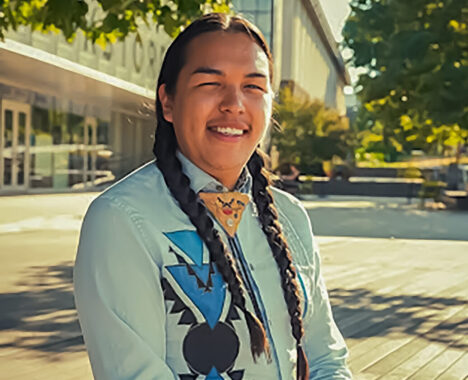
Mihskakwan James Harper
Mihskakwan James Harper is a proud citizen of Sturgeon Lake Cree Nation in Treaty 8, Alberta. He is currently the Business Development Manager at NRStor Inc., where he champions developing large-scale energy storage and clean microgrid projects in a way that empowers communities and contributes to meaningful climate action. He is a Board Member with Indigenous Clean Energy and the Pembina Institute. He holds a bachelor’s in mechanical engineering from the University of Manitoba and has recently completed a Master of Science in Renewable Energy from KTH Royal Institute of Technology and Ecole Polytechnique, and the ESADE Business School. He is the co-chair of the SevenGen council, an organization that develops and leads programs for Indigenous youth to lead in clean energy and climate action. He has co-hosted the podcast, Decolonizing Power, a series that aims to amplify voices worldwide on how clean energy enables authentic community empowerment. This experience combined with the 20/20 Catalyst program, he is passionate about the carbon free future, particularly within the power and mobility sectors. He loves his partner, family, and his community, who inspires him to work to build a future that is sustainable and empowers all.

Serena Mendizabal
Serena Mendizabal (she/her) is a Cayuga Wolf Clan-Panamanian woman from the Six Nations of the Grand River Territory. Serena is a community-based researcher, grassroots organizer, and environmental advocate. Serena began her journey in climate justice and clean energy when she was 18, working in community engagement and communications at the development corporation in her community. She found gaps in community consent and further explored what climate justice and a just transition can look like in a community of over 28,000 members. From then on, Serena has dedicated her life to Indigenous self-determination, climate justice, environmental health impacts, and clean energy transitions through studies, work, and extracurriculars. Serena is passionate about self-determined community development, action, and futures led by sovereign, healthy nations. Serena is the Co-Chair of the SevenGen Indigenous Youth Council, the Just Transition Manager at Sacred Earth Solar, a Board of Director at Student Energy, and works for Protect the Tract, a Haudenosaunee-led group focused on enforcing the Haudenosaunee Confederacy’s moratorium on development.

Janelle Lapointe
Janelle Lapointe is an Afro-Indigenous climate justice and Indigenous rights organizer from Stellat’en First Nation. She is currently the interim co-lead of Public Engagement and Mobilization at the David Suzuki Foundation and a guest on Sḵwx̱wú7mesh (Squamish), Səl̓ílwətaʔ/Selilwitulh (Tsleil-Waututh) and xʷməθkʷəy̓əm (Musqueam) territories. Janelle is also an organizer with Common Horizon, a regular contributor on CBC Vancouver’s The Early Edition climate panel, a member of the Indigenous Climate Adaptation Working Group and a council member of SevenGen Energy. She leans on her lived experience growing up on her small reserve in Northern British Columbia to ensure that intersectionality is at the forefront of environmental narratives, to build power and help others see their stake in fighting back against the status quo.

Connor Storm Johnston
Connor Storm Johnston is a Métis Man from Saskatoon, Saskatchewan, who is proud to live and work in Treaty 6 Territory and the heartland of the Métis Nation. Connor earned a Bachelor of Education from the University of Saskatchewan with a focus on Indigenous studies and Métis History, where he developed an interest in anti-oppressive pedagogy and decolonizing education. Since 2022, Connor has worked at the Metis Nation – Saskatchewan as an Infrastructure Project Manager, developing sustainable core governance infrastructure across Saskatchewan. A particular point of pride was his role in constructing a Bison Ranch in Batoche, Saskatchewan, bringing Bison back to Batoche for the first time in over 100 years. Connor is passionate about sustainable development in the Métis public service and moving towards a zero-emissions construction industry.
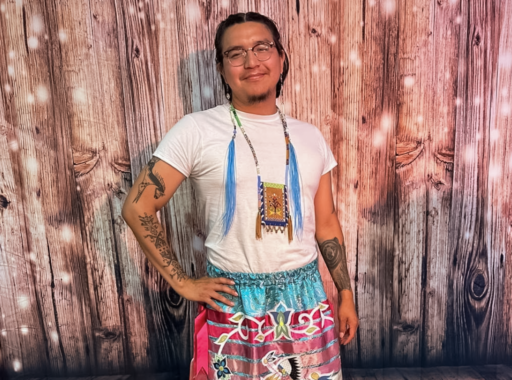
Willow Bearhead
Willow Bearhead (He/Him) proudly identifies as a Two-Spirit individual of Nakota/Dene/Cree heritage from Paul First Nation, situated in Treaty 6 territory. He has achieved Level 2 certification in Early Childhood Education from Maskwacis Cultural College and is pursuing a degree in Indigenous Social Work at the First Nations University of Canada. Willow ardently advocates for the well-being of Native youth and champions the inclusion of Two-Spirit individuals in all environments. His ultimate goal is to become a social worker who integrates Indigenous teachings into his professional practice.
Currently serving as Vice President for the Northern Campus, Willow actively fosters Two-Spirit inclusion and to create safe spaces for all. In addition to his vice presidency, he serves as the Co-national Post-Secondary Youth Coordinator for 2 Spirits in Motion and as a Youth Worker with the Prince Albert Grand Council (PAGC) Youth Homes.
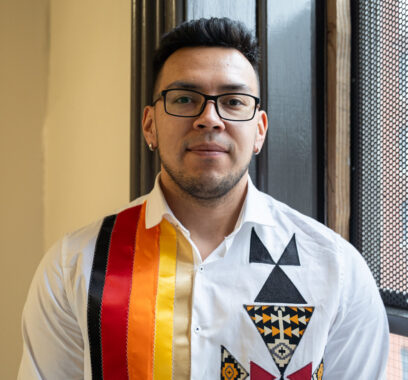
Kinnan Stevenson-French
Kinnan Stevenson-French is an Aniishinaabek from Peguis First Nation, Manitoba. Who currently lives and works in Winnipeg, Manitoba. Kinnan is currently the Environmental Lead for Peguis Consultation and Special Projects Inc. which acts as the department under the Band that leads Consultation and Engagement when it comes to Peguis’ Traditional Territory. Kinnan uses his combined knowledge of traditional teachings, practices and western education in Impact Assessment, to understand the impacts that projects, policies, and legislation might have on Peguis’ Treaty rights from an environmental perspective. Many of Kinnan’s current focus is on Clean Energy and Technology, and how it can be used to benefit his community when it comes to climate related issues.

Raylene Mitchell
Raylene Mitchell (she/her) is a proud Inuk woman from Labrador. She currently lives in Toronto working on her PhD at the University of Toronto in mechanical engineering researching energy storage solutions, more specifically for northern, Indigenous communities. She believes in indigenizing the engineering process, and is working toward a future where Indigenous knowledge and science are at the forefront of engineering designs. Raylene is passionate about community-led energy projects and accessible energy education for all. She is especially looking forward to the upcoming summit this October in Iqaluit to discuss the future of energy with other Indigenous youth from across the country.
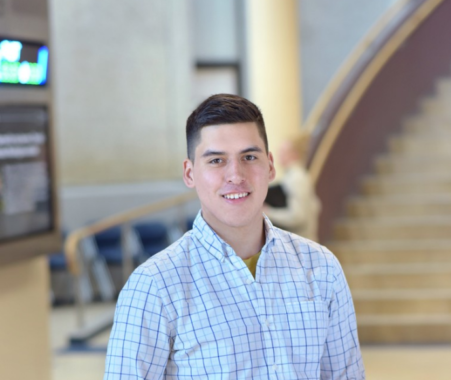
Dakota Norris
Dakota Norris (he/him) is a proud member of the Gwich’in Nation living on Treaty 6 Territory in Saskatoon, SK with experience in Indigenous youth engagement, sustainable development and climate action. He is currently completing a Master of Environment and Sustainability, focusing on increasing Indigenous ownership in the energy transition, and a Campaign Manager for the Canadian Association of Physicians for the Environment, leading initiatives addressing the health and social justice impacts of fossil fuel extraction. He is passionate about empowering and amplifying Indigenous and youth perspectives to lead a just, sustainable future. Dakota enjoys spending time outdoors, reading and learning, and with family whenever possible.
SevenGen's Indelible mark

SevenGen 2022 – The Power of Kinship was a remarkable success
Our program brought together over 150 Indigenous youth from across the country for three days of kinship-building, learning, and inspiration at Dakota Dunes in Treaty 6 Territory. The event emphasized the importance of kinship in uniting communities and inspiring innovative solutions for a sustainable energy future. The summit fulfills the aim of supporting the empowerment of future Indigenous leaders and fostering sustainable partnerships, aiming to create a shared energy vision and contribute to equitable climate action. Empowering Indigenous youth to lead in the stewardship of the Earth is essential for the well-being of future generations.

SevenGen 2019 was the first Indigenous youth-led energy summit
SevenGen 2019 marked the inaugural Indigenous youth-led energy summit. It brought together 200 Indigenous youth from all Canadian provinces and territories in Calgary, situated in the traditional lands of the people of the Treaty 7 region in Southern Alberta. This region encompasses the Blackfoot Confederacy (comprising the Siksika, Piikani, and Kainai First Nations), the Tsuut’ina First Nation, and the Stoney Nakoda (including the Chiniki, Bearspaw, and Wesley First Nations), as well as the Metis Nation of Alberta, Region III.
SevenGen 2019 was organized by a team of Indigenous and non-Indigenous youth based in Mount Royal University and aimed to empower attendees to see energy and climate action as a way they can impact their own communities, and something that can shape their future careers. With every province and territory represented, SevenGen 2019 was one of the most diverse youth programs and gatherings in Canada’s history.
How did SevenGen Start?
At the International Student Energy Summit 2017 in Merida, Mexico, Indigenous Youth Summit Co-Chairs Cory Beaver and Disa Crow Chief, first shared their vision for the Canada-wide Indigenous Student Energy Summit. The Student Energy Indigenous Youth Summit will unite communities, build relationships, and break social barriers in the energy conversation. The movement will empower Indigenous communities to lead and live sustainably through the intersection of energy, food, water, and the transition to a sustainable economy.
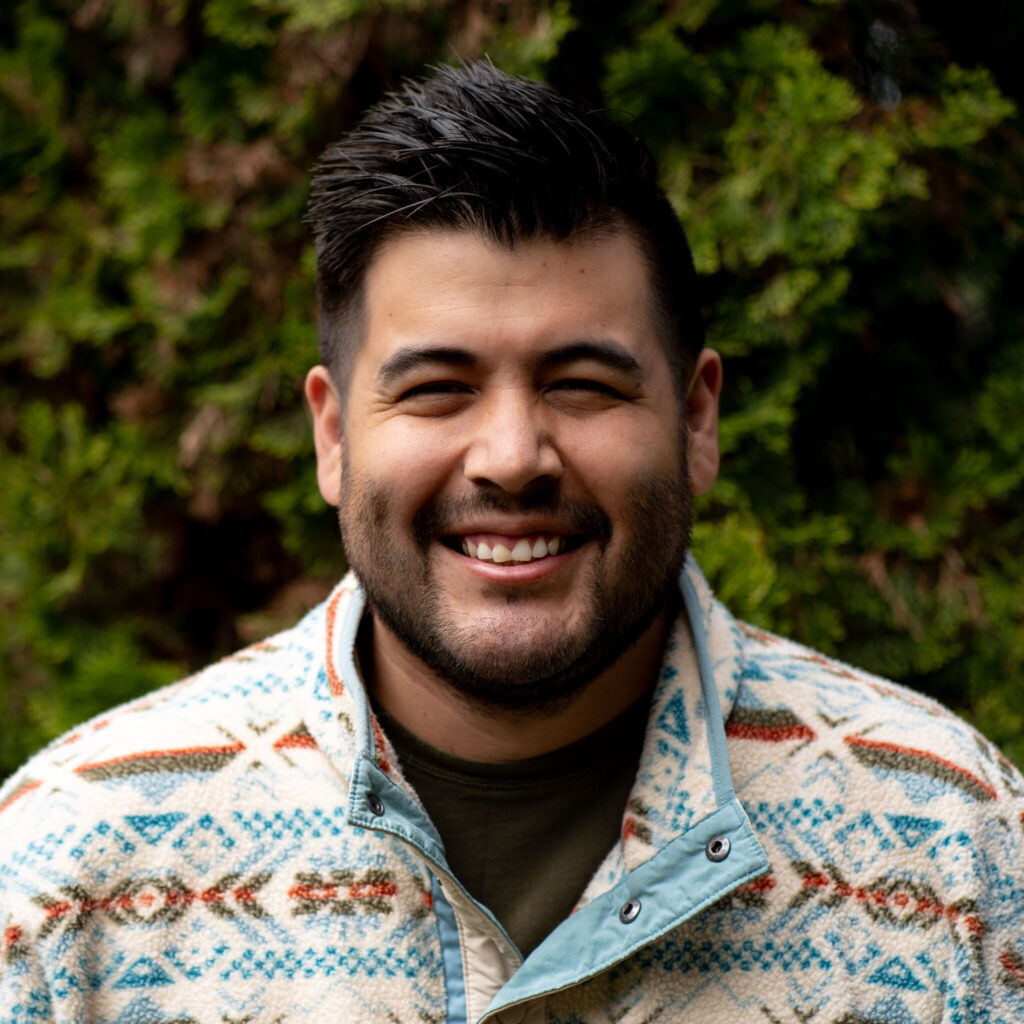


studentenergy
Loading
@studentenergy
Loading